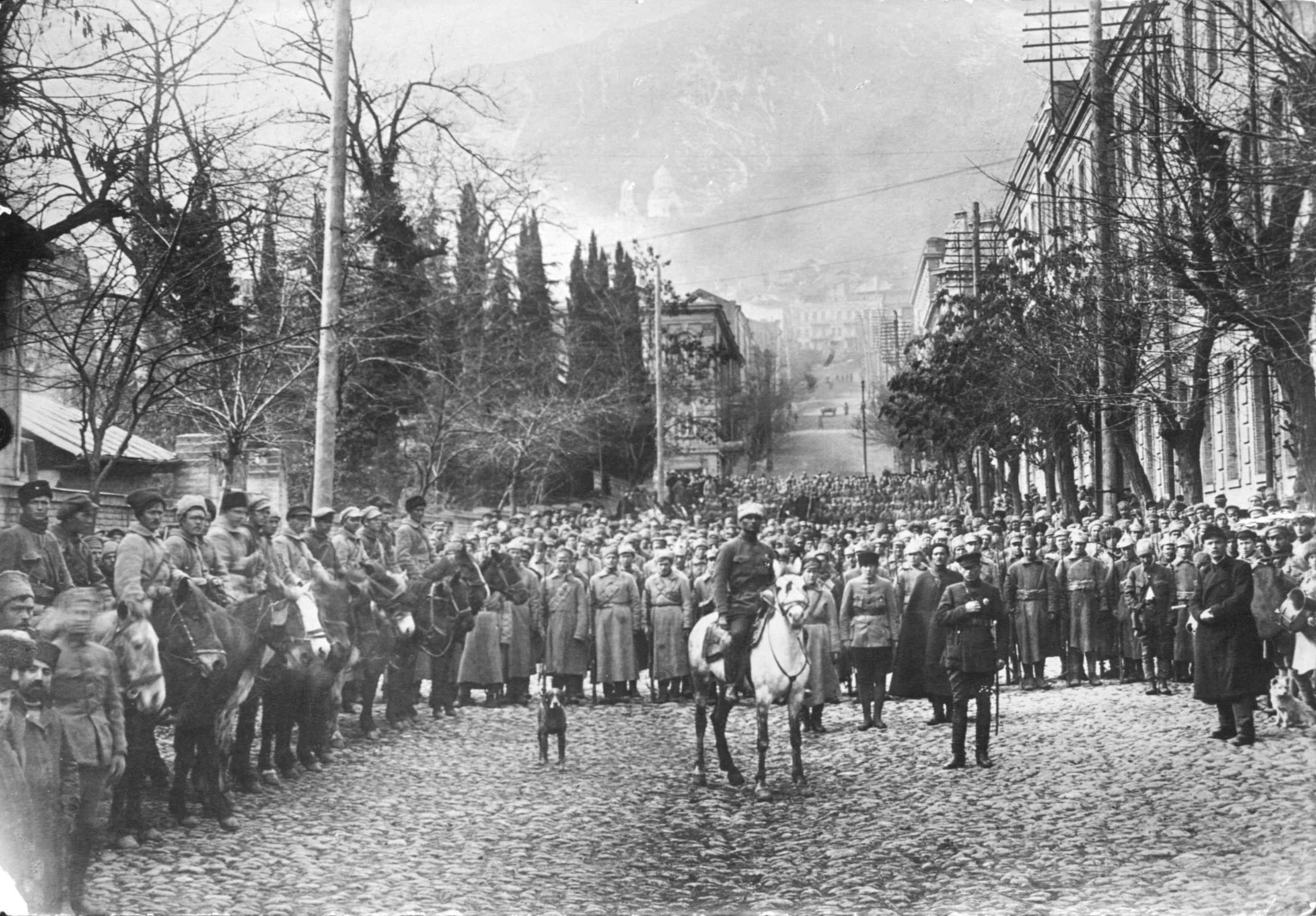
Red Army invasion of Georgia
The Red Army invasion of Georgia (12 February – 17 March 1921), also known as the Georgian–Soviet War or the Soviet invasion of Georgia,[5] was a military campaign by the Russian Soviet Red Army aimed at overthrowing the Social Democratic (Menshevik) government of the Democratic Republic of Georgia (DRG) and installing a Bolshevik regime (Communist Party of Georgia) in the country. The conflict was a result of expansionist policy by the Russians, who aimed to control as much as possible of the lands which had been part of the former Russian Empire until the turbulent events of the First World War, as well as the revolutionary efforts of mostly Russian-based Georgian Bolsheviks, who did not have sufficient support in their native country to seize power without external intervention.[6][7][8][9][10]
The independence of Georgia had been recognized by Russia in the Treaty of Moscow, signed on 7 May 1920, and the subsequent invasion of the country was not universally agreed upon in Moscow. It was largely engineered by two influential Georgian-born Soviet officials, Joseph Stalin and Sergo Ordzhonikidze, who on 14 February 1921 received the consent of Russian leader Vladimir Lenin to advance into Georgia, on the pretext of supporting the alleged "peasants' and workers' rebellion" in the country. Russian forces took the Georgian capital Tbilisi (then known as Tiflis to most non-Georgian speakers) after heavy fighting and declared the Georgian Soviet Socialist Republic on 25 February 1921. The rest of the country was overrun within three weeks, but it was not until September 1924 that Soviet rule was firmly established. Almost simultaneous occupation of a large portion of southwest Georgia by Turkey (February–March 1921) threatened to develop into a crisis between Moscow and Ankara, and led to significant territorial concessions by the Soviets to the Turkish National Government in the Treaty of Kars.
Background[edit]
After the February Revolution that began in Russia in 1917, Georgia effectively became independent.[11] In April 1918 it joined with Armenia and Azerbaijan to form the Transcaucasian Democratic Federative Republic, but left after one month and declared independence as the Democratic Republic of Georgia on 26 May, followed the next day by both Armenia and Azerbaijan.[12][13] Georgia engaged in small conflicts with its neighbouring states as it attempted to establish its borders, though it was able to maintain independence and de facto international recognition throughout the Russian Civil War, including being recognized by Soviet Russia in the Treaty of Moscow.[14]
Despite relatively wide public support and some successful reforms, the Social Democratic leadership of Georgia failed to create a stable economy or build a strong, disciplined army capable of opposing an invasion.[15] Although there were a significant number of highly qualified officers who had served in the Imperial Russian military, the army as a whole was underfed and poorly equipped. A parallel military structure recruited from members of the Menshevik Party, the People's Guard of Georgia, was better motivated and disciplined, but being a lightly armed, highly politicized organization dominated by party functionaries, had little usefulness as a combat force.
Assessment[edit]
Soviet historians considered the Red Army invasion of Georgia a part of the larger conflict which they referred to as "the Civil War and Foreign Intervention". In early Soviet history writing, the Georgian episode was considered as a "revolutionary war" and is described in just this term in the first edition of the Great Soviet Encyclopedia. Later, the term "revolutionary war" went out of fashion among Soviet writers, partly because it was not easy to distinguish from "aggression", in the Soviets' own definition of that word. Hence, the later Soviet histories put things differently. The Red Army intervention, according to the official Soviet version, was in response to a plea for help that followed an armed rebellion by Georgia's peasants and workers. This version exculpated Soviet Russia from any charge of aggression against Georgia by pointing out that the Georgians themselves asked Moscow to send the Red Army into their country, so as to remove their existing government and replace it with a communist one.[46]
Using its control over education and the media, the Soviet Union successfully created an image of a popular socialist revolution in Georgia. Most Georgian historians were not allowed to consult Spetskhran, special restricted access library collections and archival reserves that also covered the "unacceptable" events in Soviet history, particularly those that could be interpreted imperialist or contradicted a concept of a popular uprising against the Menshevik government.[18]
The 1980s wave of Mikhail Gorbachev's glasnost ("openness") policy refuted an old Soviet version of the 1921–1924 events. The first Soviet historian, who attempted, in 1988, to revise the hitherto commonly accepted interpretation of the Soviet-Georgian war, was a notable Georgian scholar, Akaki Surguladze, ironically the same historian whose 1982 monograph described the alleged Georgian worker revolt as a truly historical event.[18]
Under strong public pressure, the Presidium of the Supreme Soviet of the Georgian SSR set up, on 2 June 1989, a special commission for investigation of legal aspects of the 1921 events. The commission came to the conclusion[47] that "the [Soviet Russian] deployment of troops in Georgia and seizure of its territory was, from a legal point of view, a military interference, intervention, and occupation with the aim of overthrowing the existing political order."[48] At an extraordinary session of the Supreme Soviet of the Georgian SSR convened on 9 March 1990, the Soviet invasion of Georgia was officially denounced as "an occupation and effective annexation of Georgia by Soviet Russia."[49]
Modern Georgian politicians and some observers have repeatedly drawn parallels between the 1921 events and Russia's policy towards Georgia and Western Europe's reluctance to confront Russia over Georgia in the 2000s, especially during the August 2008 war.[50][51][52][53]